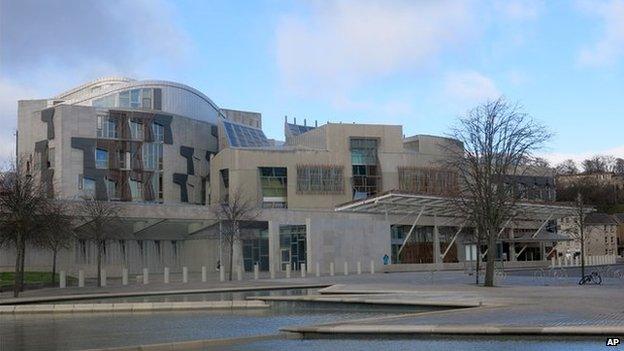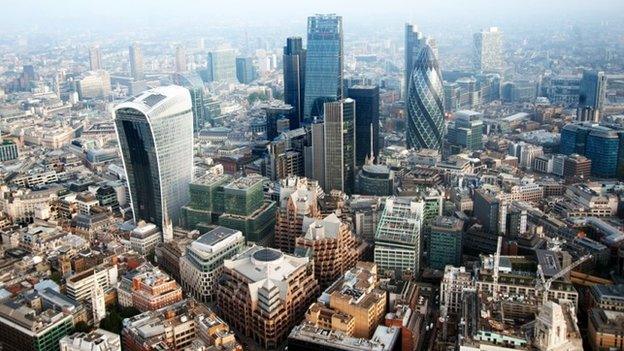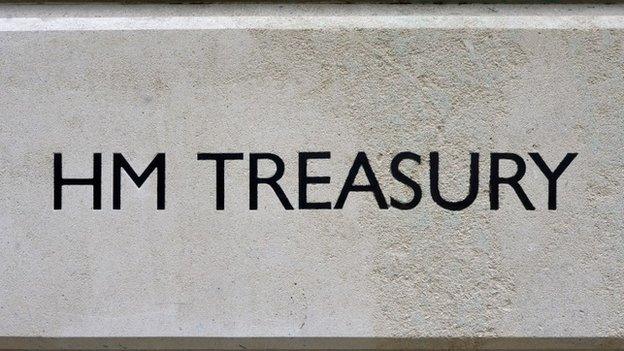Smith Commission: A deal doesn't make it happen
- Published

The Scottish Parliament has had 15 years of spending power with very little taxation accountability.
That's about to change, a lot, if the Smith Commission "heads of agreement" translate into workable new devolution legislation.
There is a political case for such radical changes.
The mood of the electorate at the time of the independence referendum, we're told, was that it wanted more change and more powers at Holyrood.
The SNP, despite having lost that vote, is even more firmly in the driving seat of Scottish politics. And after "The Vow" from pro-union parties, pledging extensive new powers, the Scottish government is "holding their feet to the fire".
For those political reasons, unionist parties, despite winning the referendum, don't want to stand in the way of devolving many more powers.
That's even if it risks cutting across the advantages of the union for which they argued. Remember Gordon Brown's speeches about "pooling and sharing risk" across the UK?

Costs and benefits

Income tax seems an obvious place to devolve, if only because it raises a lot, and it's relatively easily understood.
Welfare likewise, if only because it involves a lot of spending, and it's a means by which Scots can put into practice their oft-claimed preference for being more generous to those facing financial hardship.
So how would these work?
Well, that's less clear than the political case for making this happen. A survey of economists last week cast a lot of doubt - by a margin of 21 to four - on whether the benefits of devolving full income tax powers would outweigh the possible costs.
Other countries have as a high level of devolved taxation, so it can't be impossible to achieve.
But they don't start from the same place as the UK. And it's highly unusual to devolve tax powers in such an unbalanced way, only for a part of the country.

Crafty accountants

Here are some of the issues to watch. Scotland will have the opportunity to raise tax to pay for more generous public service provision, and to load the tax burden more heavily onto high earners.
But it's not doing so in a vacuum. People are mobile, and accountants can be crafty.
When the last Labour government put up top rate tax to 50%, the high earners had accountants who shifted payments between tax years in such a way that they avoided much of the hit, until the coalition government reduced it again. It raised very little.
A Scottish government may sustain a 50% tax rate for longer.
But within a united Britain, it looks like being very easy for high earners to move their tax address to other parts of the UK, avoiding the highest rate of tax, and depriving the Scottish finance minister of a lot of cash.
Remember: the top 1% of earners may be good at avoiding tax, but they can't be that good, as they pay around 30% of all income tax.
The share in Scotland is lower, but still substantial. If it's 20% of all income tax, these are people John Swinney and his tax-setting successors will wish to keep on board and in Scotland.
As for those, like Sir Brian Souter of Stagecoach, who take much of their pay in dividends, equity and interest, that is unlikely to be taxed in Scotland, due to its complexity.
The Scottish Parliament can also lower tax, competitively.
If it slashes or axes Air Passenger Duty, that could help the economy, and tourism in particular.
But at least initially, an existing tax that goes uncollected is a gap in the budget. And that's with tightening budgets anyway, and a big appetite at Holyrood for spending more.

Finance casino

What, then, if circumstances change? Year one looks simple enough. But after that, both sides can change their tax rates, and economies are almost certain to diverge.
Longer term, there's demographic change. The ratio of tax-paying workers to public service-using non-workers is shifting, and quite alarmingly, across developed countries.
If England gets lots of immigration, but Scotland doesn't (and has no power to do anything about that), the tax base may shift and leave Scotland with more of a challenge to raise the income tax to fund health and social care.
That's because risk is heading to Holyrood. In place of the efficiency of a single tax system with risk being held at the centre, the tax system is being broken down.
The risk of tax revenue falling short is being devolved too.
If there's a downturn in oil activity, for instance, Scotland would lose out in income from the sector's workers.
If pay and bonuses boom once more in the City of London's finance casino, the income tax benefit will be enjoyed by the Treasury in London, not Scotland. And, of course, vice versa.

Fiscal prudence

If London's tax take falls short of expectations, as it's been doing this year, it can mean spending cuts, but it more often means extra borrowing.
If Scotland's income tax take does so, perhaps due to economic downturn, significant borrowing powers would be required. Without them, government spending would have to be cut, and that would both exacerbate the downturn, and stoke up political tensions.
But the UK Treasury has been very reluctant to give away borrowing powers, as they form a vital part of its macro-economic management.
And as Alistair Darling, the former Chancellor and Better Together chairman, has pointed out this week, if the Treasury isn't raising all the income tax, it is less well placed to honour its own debts, so borrowing costs could go up for the whole of the UK.
Westminster politicians may be persuaded to do a deal on devolving more powers. But it's not in the nature of the Treasury to do so with a faith in the fiscal prudence of others, or in the hope that things will work out for the best. Don't expect it to share the breezy optimism of Scotland's constitutional buccaneers.

Barnett fairness

Aside from borrowing, how could measures be put in place to even out these imbalances across the nation, to ensure that there's still some sharing of risk - either in a short term divergence, or over a longer-term one?
That's where there has to be a funding formula or a negotiating mechanism for a continued transfer of funds from the UK Treasury to Holyrood.
The frantic final days of the independence referendum campaign saw a unionist promise that the Barnett Formula would be continued, 36 years after it was put in place as a short-term measure to allocate changes in Whitehall spending to Scotland, Wales and Northern Ireland.
It may be maintained, but it is going to need a lot of additional calculations to take account of powers already being handed over through the tax powers in the Scotland Act 2012. Many more that can be expected to follow from the Smith Commission.
For instance, it is already assumed that if an income tax rate is raised in the rest of the UK, but not Scotland, then there would be a reduction to the size of the block grant to Holyrood.
It's possible to imagine disagreement on how big that reduction should be.
If you think it could or should be easy, take a look at this explanation of the options and challenges, external by Professor David Bell and David Eiser at Stirling University, which comes with a warning of being "wonkish".
Prominent in the mind of Whitehall politicians will be pressure from other parts of the UK to reduce the size of transfer to Scotland, including a demand from Wales and others for a new calculation based on need.
Once all this is settled - if it ever is - we may still have something called the Barnett Formula.
But its creator, Lord Joel Barnett, the recently deceased Labour Treasury minister, might be unlikely to recognise much of it.